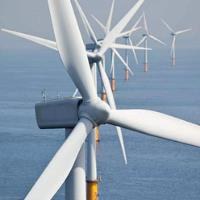(LUXEMBOURG) – Nine countries from the North Seas region agreed Monday to strengthen cooperation on energy, with a view to exploiting in particular the potential of the North Sea as an area for wind farms.
At their meeting, ministers from the countries involved the Netherlands, Germany, Belgium, Luxembourg, France, Denmark, Ireland, Sweden and Norway as well as EU Energy Commissioners Maros Sefcovic and Miguel Arias Canete signed a political declaration and action plan, agreeing in particular to collaborate on the planning and construction of offshore wind farms.
Their aim is to reduce building costs through collaboration, as well as looking at whether national regulations for grid management, subsidies and permits could be better harmonised.
In addition, the countries are to undertake research into how they can better coordinate national requirements for the offshore wind sector in terms of safety or the environment.
One possibility is that future wind farms located close to each other in the various neighbouring countries will be connected via one single electricity cable from the sea to the land instead of a separate cable for each country.
On the cost front, they will involve interested parties such as social organisations, knowledge institutions, nature organisations, network managers and the business community.
For the Dutch EU presidency, energy minister Henk Kamp said that better collaboration will enable the construction of wind farms in the North Sea at a lower cost: “the coming years will see the construction of several big wind farms in the North Sea, including five big farms in the Netherlands. This will contribute to an overall increase in the proportion of renewable energy in Europe, rising to 20% in 2020.
“Despite the scale of construction, there is still a great deal of space available in the North Sea. In collaboration with other countries, we are investigating what more can be done post 2020 and in the run-up to and period after 2030, as we wholly expect that the amount of wind energy will continue to show substantial growth in Europe,” he added.
The action plan will also facilitate the building of missing electricity links, allow more trading of energy and further integration of energy markets.
Reinforcing regional cooperation in this way is expected to contribute to reducing greenhouse gas emissions and enhancing security of supply in the region.
Political declaration on energy cooperation between the North Seas countries


